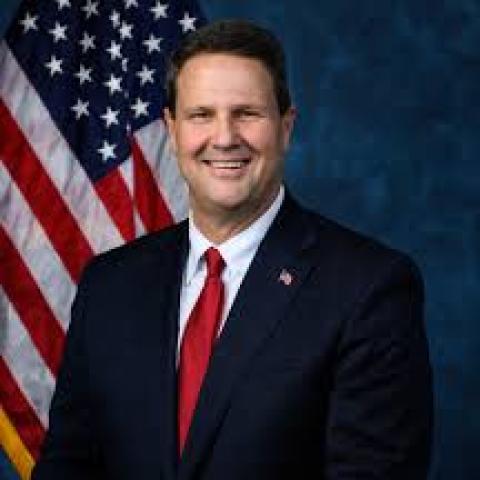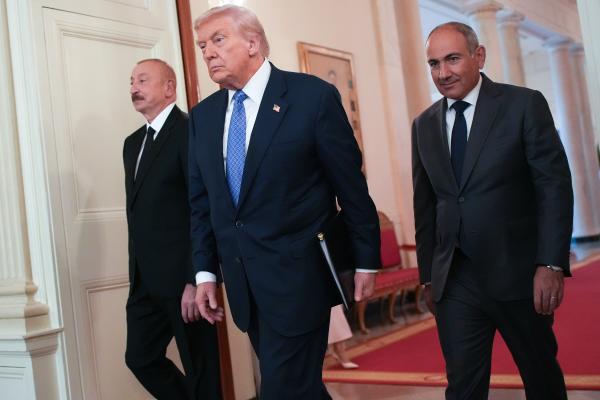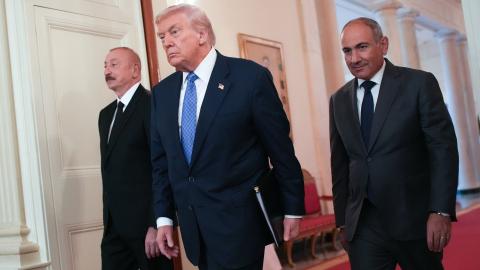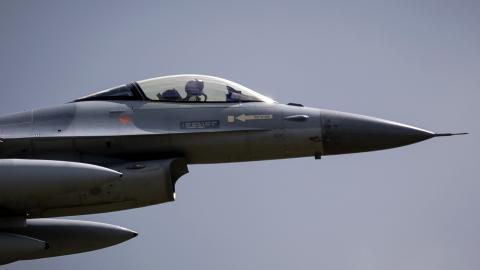
Defending in Outer Space: A Conversation with Congressman Jeff Crank


United States Representative, Fifth District of Colorado

Senior Fellow and Director, Keystone Defense Initiative
Rebeccah L. Heinrichs is a senior fellow and director of the Keystone Defense Initiative. She specializes in US national defense policy with a focus on strategic deterrence.
Americans rely on satellites for everyday needs like banking, communications, and weather assessments. Meanwhile, the Department of Defense uses space assets for command and control, navigation, and missile attack detection. The protection of space-based equipment is therefore imperative for the security of the United States and the American way of life. But Russia and China have been actively developing and deploying weapons to target US and allied assets in space.
Join Hudson Senior Fellow Rebeccah L. Heinrichs, the director of Hudson’s Keystone Defense Initiative, and Congressman Jeff Crank (R-CO), a member of the House Armed Services Committee, for a conversation about the threats to American satellites and the policies and programs necessary to defend US interests in space.
Event Transcript
This transcription is automatically generated and edited lightly for accuracy. Please excuse any errors.
Rebecca Heinrichs:
Welcome to Hudson Institute. My name is Rebecca Heinrichs. I’m a senior fellow here at Hudson and the director of our Keystone Defense Initiative. Here at Hudson, we are focused on ensuring that we provide sound advice, policy recommendations for policymakers to ensure that the United States can protect the American people and promote security, freedom and prosperity, not only to ourselves, but to our allies. I run the Keystone Defense Initiative here at Hudson. So we focus on strategic deterrence, missile defense, nuclear deterrence, and of course we care a great deal about the security of space. And that is why I’m so privileged to welcome our speaker here today, Congressman Jeff Crank from Colorado. He has represented Colorado’s Fifth District just since this year, 2025, and he’s doing an amazing job leading the charge on bringing awareness to the great value that the United States places on the security of our space assets, and then also the dangers to them.
He’s currently a member of the House Armed Services Committee where he sits on the subcommittee on strategic forces, on military personnel, and on cyber information technologies and innovation. And he is also a member of the House Natural Resources Committee. Representative Crank has supported initiatives important to adapting America to the ever-changing strategic environment, such as pushing to establish a Space National Guard, and calling for increased sanctions against Iran. Congressman Crank’s District is based in Colorado Springs and includes multiple Air Force and Space Force bases, including Peterson Space Force Base, which is the headquarters of NORAD, US Northern Command, and US Space Command and Schriever Space Force Base, which hosts the command and control for many DOD satellite systems, including GPS.
So sir, it’s a great privilege to welcome you here at Hudson, and I’m going to turn the floor over to you, sir, to make some initial remarks and then you and I can engage in some conversation. Please welcome Congressman Crank.
Jeff Crank:
Thank you. Well, thank you. Thank you, Rebecca. It’s my honor to be here with you today and to talk about something so important to America, to the future of the world in that space. I’ll start by saying most Americans don’t understand how much we rely on space in our daily lives and the importance of protecting space and our presence in space. Literally, an enemy could shut our economy down overnight through space and through an attack in space because we would shut down financial transactions, we would shut down shipping across our country. Literally, every aspect of our life would come to a grinding halt if we don’t protect space because America as an economy, but also as a military relies so heavily on space. It’s so important to us in our daily lives and to the war fighter. And to the war fighter, to the US war fighter, I think we rely on it much more than other countries do. So that’s certainly a positive thing for our military. But at the same time, that is something that our enemies could exploit by taking us away from that.
So the US, in my view, must meet that threat, and it’s why President Trump and Congress created the Space Force. I am very proud to represent a lot of Space Force in my district. I’ve heard somewhere upwards of almost 90% of Space Force resides in my district in Colorado Springs. And I’ve really been encouraged by the president so far on his focus that he’s already placed on defense and on space in his second term. And you see that in the request in reconciliation to plus up defense, but also to plus up space in that.
As we’ve had our hearings, I’ve asked every single combatant commander the question, and everyone that I’ve met with, about the space-based threat from Russia and China, what’s happened to it in the last five years? Has it gone down? Has the threat gone down? Has it stayed the same or has it increased? And every single combatant commander has said the threat has increased. Everyone has said that the threat has grown far worse. And I think that that is true. And today we’ll have the CENTCOM commander and AFRICOM commander at HASK today. I suspect I’ll get the exact same answer from them as well.
And of course, China and Russia have determined space to be essential to their national security goals as well. The first shots in the invasion of Ukraine was a Russian hack of a satellite company to cripple Ukraine’s communications. That should tell us a lot about the future of warfare and how it may begin. And that highlights really the need for us to protect not only our on-orbit assets, but also the ground-based infrastructure that we rely on as well.
Russia is continuing to develop its anti-satellite weapons that could make low-Earth orbit uninhabitable for at least a year. And I’m sure we’ll a little bit more about that. China is exponentially growing their launch capability, racing to catch the United States and develop advanced counter-space capabilities. They have working to develop direct ascent, anti-satellite weapons, co-orbital hunter killers, directed energy, as well as PNT denial.
Now, as I’ve talked to folks about China and tried to figure out how do they view us, how does China view the United States? And I think from everybody that I’ve talked to, China views us as 10 feet tall in that area, but they view themselves now as maybe seven or eight feet tall. And they’re catching us and they’re investing. It’s good that they believe we’re 10 feet tall, but they are racing to catch us as quickly as they can.
The Chinese sum it up pretty well. They have a phrase that they use that they say, whoever controls space controls Earth, we should take heed of that because right now the US does control space. We no longer live in a world where we can assume with absolute certainty the availability of space systems in the future. For a long time, America and our military focused on space as... We didn’t want to weaponize space. It wasn’t a place that we wanted to weaponize. And while we had that viewpoint, our adversaries went out and weaponized space. And so from that standpoint, we do have to catch up in our minds about what the military threat from space really is.
It’s impossible to conduct modern military operations without space. It’s the nexus for every single branch of service. And without space, if you think about it today, we would essentially have to revert back to a Vietnam era warfighting, where we’d be using hand maps. We’re so reliant with GPS, with all of the other assets. Every aspect of our military relies on space, whether it’s GPS. There’s not really an alternative without space other than, as I said, maps. Hypersonic missile defense. Without space, we won’t be able to defend against hypersonics. The current ground-based radars will be ineffective because of missile flight, the profile of hypersonics.
Russia has already declared that they view commercial satellites as fair game to target. That’s a game changer as well. Russia makes it very clear that in war, they want to take away the asset of space to the United States.
So how do we lead and look forward as members of Congress? What do we do to try and confront this? I was very proud to see the president put forward the Golden Dome Initiative, and I’m a strong supporter of that. We can talk a little bit more about that, but I do want to note that I am going to start the Golden Dome Caucus in Congress. Of course, Golden Dome is going to be a generational leap forward in the defense of the homeland. And I think as members of Congress, we need to be ready to do that.
Now, the President, as I said, had, in my view, bold vision to talk about Golden Dome. I’ve had several folks and in Congress who have challenged whether Golden Dome is technically feasible. In fact, we’ve had hearings and we’ve talked about is it technically feasible? And from every combatant commander that I’ve talked to and others, they say, “Yes, it is technically feasible. We’re going to have to invest lots of resources to get this done,” but that it is. And my answer to that is, everything America’s ever done that’s worthy of greatness was hard to do. There were lots of people who said, when we tried to put someone on the moon, that it couldn’t be done. And yet there were folks who continued to push and we were able to do that. The same is true with Golden Dome. We will have those who are naysayers.
And I go back to, I was in committee the other day and a member on the committee who is not in favor of ballistic missile defense, essentially, and certainly not in favor of a Golden Dome, talked about how it’s just never going to work and those sorts of things. And I said, it’s interesting. I have an interesting perspective. I served as a staff member on Capitol Hill with the House Armed Services Committee. My boss was a subcommittee chairman on House Armed Services Committee back in the ‘90s. And we already had this discussion. And the same sort of folks were saying the same things about ballistic missile defense in the 1990s. It’ll never work. I remember God, his soul, Ron Dellums, who was the chairman of the House Armed Services Committee, very liberal member from Berkeley, California, but a good person, just constantly fought over whether or not we could ever do this. In fact said, “The patriot missile system’s never going to work. You’re going to literally shoot a missile out of the air with another missile? It can’t happen.” It happens all the time. And as I say to the naysayers today, tell that to the people of Israel that it won’t work. It will work, it does work. And we have to look forward to the technological advances that it will take to make Golden Dome successful.
Our current missile defense is designed to counter a rational co-equal global power with a limited number of available missiles. We’re not there to confront rogue nations like North Korea or Iran, or a large-scale attack launched by China or Russia. And that’s what we must prepare for.
Jeff Crank:
... or Russia, and that’s what we must prepare for.
Our traditional ground-based radars cannot detect hypersonics until it’s too late. They’ll have to be space-based sensors. And as I said, that’s why I’m pleased to announce the creation of the House Golden Dome Caucus. I’m going to co-chair that along with Representative Dale Strong from Alabama, and excited about that opportunity. The Caucus is going to serve as an opportunity to host open and classified briefings for members of Congress to hear from military leadership on Golden Dome, industry partners, and of course think tanks. We’re going to partner with Senator Sheehy, who’s the Senate Golden Dome Caucus Chair, and I’m excited about that. He’s been really a great ally on this as well.
The president wants Golden Dome deployed in three years. Now, to do that, he’s going to need strong support from Congress. And the House Golden Dome Caucus, I think, is going to help lead the charge in that support for the president.
So with that, Rebecca, I would welcome any discussion you’d have, and I just thank you for the opportunity to come speak about this. Such an important topic that I think most Americans just don’t even... They just go through their daily life and they don’t think about space and how it impacts them. So happy to have whatever discussion we have. Thank you.
Rebecca Heinrichs:
Well, thank you. Thank you, Congressman. That was wonderful, and especially pleased to hear about the Golden Dome Caucus, and we will dig into that a little bit.
Jeff Crank:
Yeah.
Rebecca Heinrichs:
If I can, let’s first... What caught my eye, I was watching the hearing that you participated in with General Covoli in discussing Russia’s war against Ukraine, where you mentioned that a lot... just as you did in your opening remarks, a lot of Americans don’t understand that the first attack was actually against space assets, and you mentioned it was a cyber attack.
Can you give us any more information about that in an unclassified setting about what kind of damage it did or just the effect that had in its importance?
Jeff Crank:
Yeah. Well, first I guess I’d start by saying people sort of separate space from cyber, I mean on the committee, House Armed Services Committee, we separate those. We deal with space under the Strategic Forces Subcommittee. We deal with cyber under the Cyber Subcommittee, so we probably do it ourselves as well, but they’re one and the same. A cyber attack against space assets’ ground-based assets, takes out that space capability.
And obviously we know the damage that that can do, and we saw it in the case of what the Russians did to Ukraine, completely makes you blind. What would happen to the United States if we were blinded, if our GPS was gone? Well, not just to our lives as civilians, but what would happen to our military capability and what backups do we have to make up for that if we did?
Obviously America is heavily reliant on space, and that’s a good thing. It gives us such a great advantage, but what happens if that’s taken away, if you’re so reliant on it?
I think we’re learning lessons, not just that, but coming out of Ukraine, we’re learning a lot of lessons about the way that they’re fighting wars. We have to prepare for those wars as well, not just the wars that we fought in the past. And I think we’re learning a lot of tactics about cyber attacks, about those sorts of things, but about also using drones against tanks and things like that in Ukraine that we have to heed as policymakers, because if we don’t, we’ll have a very bad catastrophe on our hands.
I liken it to sort of David and Goliath. I mean, we just have to prepare for that one rock shot to the forehead of America. And so we may be fighting another Goliath, but we also may be fighting David, so we have to be prepared.
Rebecca Heinrichs:
Well, and I think it’s interesting too because you made the point that the Russians do not... they do not restrain themselves against hitting or attacking things or disabling things that have directly civilian applications. In the case of this cyber attack, it took out tens of thousands of internet users, not just in Ukraine, but in Europe.
And I thought that was remarkable you brought that up. And then of course, General Cavoli said we need to discuss more about this in the classified setting.
But really important to remind people that, and that the United States has to have a response and to help our allies have a response that’s not necessarily even directly back in the cyber domain, that sometimes we can create a response to impose a cost in a different domain. It doesn’t necessarily have to be cyber versus cyber, but we have to come up with those responses.
Jeff Crank:
Yeah, that’s right.
Rebecca Heinrichs:
Another kind of attack, I thought this was interesting against a space... The Russians, right before Russia invaded Ukraine, it did a series of pretty provocative things. One of the things that it did was it launched an anti-satellite attack against one of its own satellites, spewing debris. So you have another kind of attack, is kinetic, and you can talk to different experts and they’ll disagree on whether or not that was meant to send a signal to the United States that it was about to do something aggressive. But I thought it was pretty telling, and President Biden’s response was pretty muted.
Jeff Crank:
It was.
Rebecca Heinrichs:
If you have anything to say about the effect that that anti-satellite weapon had, and what potentially we should have done, or your response?
Jeff Crank:
Well, and I think it plays into the larger threat from Russia, right? We are heavily reliant on space. We’re reliant on low-Earth orbit. Russia sees that as they want to exploit that vulnerability. They aren’t as reliant on space there. So do they care if there’s debris in low-Earth orbit? It affects us far more than it affects them. So for them to be able to deny us that is their goal, that’s their aim. And it’s not just obviously the debris issue in space.
Also, the elephant in the room that we all worry about is the anti-satellite capability that Russia is developing that we can’t talk about too much in this unclassified setting. But obviously we have to be very concerned about that, because that too is meant to simply deny us low-Earth orbit, and the ability to operate there.
Rebecca Heinrichs:
I also point out too, the attack that Russia launched, that anti-satellite weapon system, created lots of debris. We had astronauts at the International Space Station who were at risk.
Jeff Crank:
Yeah.
Rebecca Heinrichs:
My understanding is our government knew that they were about to do it, tried to convince them not to do it. They went and did that anyway, so it’s important as you point out, sir, when you create that kind of debris, it’s not like this is just... it’s not just a local problem for Ukraine. Russia is not just a localized problem for Ukraine. Russia is posing a threat that affects the United States of America and our allies.
Jeff Crank:
Yeah. Well, and obviously with the proliferation of commercial satellites that are out in low-Earth orbit that we rely on on a daily basis here in our daily lives, that is all affected by a Russian attack. Whether it is space debris from something that they do, or this other threat that is out there as well from Russia.
Rebecca Heinrichs:
And then I do want to talk about, you brought up, you kind of got at it a couple different ways, but we can talk a little bit about what’s already been in public about this other capability that the Russians are developing. And Congressman Mike Turner really tried to sound the alarm about this about a year ago, I think it was. And so I can just quote from former Assistant Secretary of Defense for Space Policy, John Plumb, I’ll just stick with his quote.
And he said, “The concept that we are concerned about is Russia’s developing, if we are unable to convince them otherwise, to ultimately fly a nuclear weapon in space, which would be an indiscriminate weapon.”
And then to your point, sir, if it would be detonated in low-Earth orbit, it could take us offline for up to a year, and obviously that would be a violation of the Outer Space Treaty, which just prohibits weapons of mass destruction on orbit as well. And so now you have the cyber, you have the conventional ground-to-space capability, and now you have something... You’ve got other kinds of things they can put on orbit, but now this, which would be an incredibly destabilizing problem for the United States of America and our allies.
Jeff Crank:
Yeah, and for the world economy. I mean, I think we have put more satellites into space in the last two years than we put prior all the way back to Sputnik. So the proliferation of commercial satellites around the world is growing. Many, many, many of those are in low-Earth orbit, and there is no care, if this weapon were used by Russia, there’s no concern for that, for what it would do to the economy, what it would do to deny us access to space from military standpoint as well.
Rebecca Heinrichs:
And even if they were to put this on orbit and not detonate it, because sometimes I’ll hear people say, “Oh, well, Rebecca, they’ll never detonate it.” But the coercive effect that that would have on everything that the United States does militarily or commercially is enormous, and should be intolerable. Do you agree?
Jeff Crank:
Yeah. It’s taking a hostage, it’s equivalent of Hamas or some group taking a hostage, right? The fear that puts into you that at any moment you can push a button and you can cause havoc, wreak havoc, is a big fear over our economy, and that’s something we have to plan for. And I know that the president, the national security infrastructure, is planning for how to deal with that, but it’s a difficult one.
Rebecca Heinrichs:
It is. Okay, and then this is a great then tee up then for Golden Dome, because I think some people who haven’t been tracking what the adversary has been doing, we’re just even talking about Russia and haven’t even gotten into the remarks that you made about the Chinese as well, and they’re doing a lot there as well, you often hear people say, “Oh my goodness, this is going to be destabilizing. If the United States has a space-based kill capability to protect space assets, and also protect ground and sea-based assets, but from space.”
How would you respond to that?
Jeff Crank:
Yeah, well, I think that’s, to be honest, it’s a Pollyanna view of the world to say, “Well, we don’t want...”
I mean, this is what we’ve lived under for the last many decades is America sat back and said, “Well, we can’t weaponize space.” But while we sat and thought about that other countries were weaponizing space, China, and Russia, and others were seeing holding that high frontier and the value of having that. So this is the same.
If we were to sit back and say, “Well, we don’t want to create Golden Dome because it gets rid of mutually-assured destruction,” are we assuming that none of our enemies care to change the balance of power and mutually-assured destruction? If China could have the technical capability to provide themselves with the Golden Dome, would they? Of course they would. Would Russia? Of course they would. They’re trying to get that advantage over the United States.
So it’s naive for us to think that we can just continue to live in a world that existed in the 1950s. I mean, we’re 70 years past that, 75 years past that time, and we still have people who look back fondly at the idea of mutually-assured destruction. We aren’t there anymore. The world isn’t there anymore.
So for us to sort of think that somehow we can survive just by doing that, and that our adversaries are not going to pursue these kind of capabilities is really crazy.
Rebecca Heinrichs:
Yeah. I served as-
Jeff Crank:
It’s really crazy.
Rebecca Heinrichs:
Yeah. I served as a commissioner on the US Strategic Posture Commission, it was a bipartisan commission. We also came to the conclusion, we didn’t call it Golden Dome or anything like that, didn’t even say that it had to be space-based, but we said that we should definitely look at space-based options, but we did come to the conclusion that we have to build a more robust homeland missile defense to defend against the coercive threat from the Russians and Chinese at the very least because we do not believe that the homeland is a sanctuary against these countries. And in fact, to your point, sir, they have not been restrained in their own missile defenses. Both China and Russia have been building integrated air and missile defense. So this idea that if we remain restrained that we would encourage restraint on their part in building defenses, it hasn’t come out. It hasn’t been the case.
Jeff Crank:
Yeah, it’s not the case now and it won’t be the case in the future. It’s not the case now with the technology that we have today. Certainly, with the technology we’re going to have in five or 10 years or that the Chinese or the Russians are going to have in five or 10 years, it’s not going to be the case. So we have to plan for that.
Rebecca Heinrichs:
Okay. So then you mentioned then the technical feasibility question. So you are Colorado Springs. It’s probably impossible to walk in the north without bumping into an engineer.
Jeff Crank:
That’s right.
Rebecca Heinrichs:
So I assume then, sir, that you have talked to a lot of people who say, “We can do this and we can build what the President wants.” My understanding right now, there’s a lot of questions about how we are going to do this? Three to five years, we’re going to get the President, deliver him a capability that provides increased defense.
Do you have any ideas about how to sequence this or what it might look like or what you’re most concerned about? Is it the protection of space-based assets first, or is it putting something on orbit to provide increased homeland defensive infrastructure on the American homeland? How do you envision this?
Jeff Crank:
Well, I started off by saying I’m not that engineer that has to figure it out, thankfully, for America. We have people who are much smarter than me to figure it out. Yeah, I think when I talk to industry, all the industry that I talk to says that it’s technically feasible to do, it’s going to take investment. But also, as I mentioned, some of the combat commanders, I specifically asked the commander of the US Space Command about it, and I specifically asked the commander of US Northern Command, is this technically feasible? And they say, “Yes.” In fact, some members of the House Armed Services Committee continued to push that after I asked that question. Some members who are not in favor of Golden Dome continue to push that. And the four stars, the combatant commanders all said, “No, we can do this. This is technically feasible. There’s ways to do it.”
We know that we have to detect from space. So we know that. The ground-based sensors aren’t going to be the answer because particularly with hypersonics, you’re going to detect them too late with ground-based sensors. So we’re going to have to have space-based sensors. The Hypersonic and Ballistic Tracking Space Sensor system is something that we’ve already seen as promised. We’re going to need low Earth orbit constellation. And then we’re going to have to continuously track any hypersonic threat, but that’s going to have to be done from space. So that’s going to have to be sort of the first piece of that.
Then we’re going to have to have space-based interceptors because we have to intercept hypersonics much earlier in flight than a traditional ballistic missile. We also can’t just rely on all of the domestically positioned interceptors that we have because they’re oftentimes not going to get to the threat in time. And we’ve got ground-based systems that are in other parts of the world, and we won’t be able to rely on that. So it’s clearly going to have to be a space-based system, both from a sensing standpoint and from an interceptor standpoint, at least now at first.
Rebecca Heinrichs:
That’s great. And just for those watching too, because we do... You don’t ever want Americans to hear... The first time, I told some girlfriends, “We can do this. President Trump’s right, we should do Golden Dome.” And they think, “Don’t we already have that?” And they’re horrified that we don’t. And I said, “Well, we do have a limited missile defense system, the ground-based interceptors in Fort Greely, Alaska and Vandenberg, California do provide the American people with a limited missile defense that can protect us against the limited threats from North Korea. But we are not anywhere near where we should be.”
I know Congressman Elise Stefanik has been really great on trying to get us additional defenses for the East Coast because we’ve got an Iranian problem if they do get an ICBM capability, so from the East coast. But we’ve got a problem from space and then from the peer threat. Our system is just not designed, as you say, to handle this more sophisticated threat. And then we’ve got the drone problem. So critical infrastructure is just too vulnerable against the drone problem. And I think the President’s executive order was pretty clear, it laid out all those different things he wants to defend against. So if we can sequence it, as you say, figure out what are the most important things, do that first, do what we can do, and then build on that, it’s entirely doable. We can get this done.
Jeff Crank:
First of all, we can’t sit back and say, “It can’t be done.” I always use that example of sending someone to the moon. That also wasn’t possible when we first started to do that. But we are a country that when we embrace big ideas and we put the resources to that and the technical knowledge and capability, that’s when we shine. I’ll just throw this out, we may get to this as well, but I look at China, particularly, they have a lot of advantages over us in some ways. They don’t have to go to Congress and get money appropriated. They don’t have to live under continuing resolutions. If they want to build more ships, they build more ships.
If they want to build more satellites, they build more satellites. And it’s a quick decision that a government-controlled economy gives them that advantage. But we have advantages, and our biggest advantage is the free market system, right? Now, oftentimes, the Pentagon beats the free market system out of the procurement process, but when we allow the free market system to work, that’s when America is at its best, whether it’s pushing the envelope on some of these technological advancements. A great example I use all the time is space launch. We had a space launch system that was inadequate during the space shuttle time and after the disasters there, was a period of time where we couldn’t launch into space.
The United States of America couldn’t launch satellites. We had to rely on other countries. But what got us out of that was the free market system. We said, “Here’s what we need to do, go chase it.” And we let the free market system find it, and we now have the greatest launch capability in the world. So we have to find ways within our free market system to use that advantage that we have to drive the technological advancements to get us there to do this. It’s the same way that we did it in the Space Race and got to the moon.
Rebecca Heinrichs:
And to do it very quickly.
Jeff Crank:
To do it very quickly, yeah.
Rebecca Heinrichs:
I tell people too, the last time, I think, the Institute for Defense Analyses looked at what it would cost to do something like a space-based defensive layer. I think it was then-Senator John Kyl who had initiated the study by IDA, and the bulk of the costs came from the launch of the satellites, but the launch of the satellites, the cost has gone way down. And you can see that through Musk’s Starlink. So I think that really gives us some encouragement that it is technically possible if we can leverage some of these advances that have happened in the private sector.
Jeff Crank:
Yeah. You mentioned Starlink. We’re now looking at a competitor to Starlink, right? This is moving so quickly. Space moves so quickly. We can’t be afraid of it, and we can’t allow people to just say, “Oh, it just can’t be done.”
Rebecca Heinrichs:
Yeah. Well, great. Well, I’d love to take a couple of questions from the audience if you all have some. Take one here, right in the... Can you just please state your name and affiliation and then your brief question?
Glenn Barney:
Hi. I’m Glenn Barney from KSAT. Good morning, Congressman.
Jeff Crank:
Good morning.
Glenn Barney:
I think it’s arguable that Colorado’s the world capital of the commercial remote sensing industry. In the news over the last couple of weeks, there’s been talk about budget cuts, the NRO cutting their commercial data buys. Do you think that’s a good idea? And if not, is there anything that can be done to bolster that segment of the industry?
Jeff Crank:
Well, I think we’ve got to be very careful. We’ve talked about the importance of space just in general, and I was happy to see a $2.7 billion-plus up in appropriations markup for space. I think it was yesterday that that news came out. No, it’s not a good idea. I think it’s not a good idea to cut back on any... We ought to be putting the foot on the gas when it comes to funding for space right now, all sorts of space, whether it’s launch, satellite capability, mapping, all of that kind of stuff.
Rebecca Heinrichs:
And do you think there’s bipartisan support for that, sir?
Jeff Crank:
I do. I actually do. Obviously, Golden Dome is the exception. For whatever reason, that really triggers the left when you talk about Golden Dome, and I don’t know why that is. They hated it when it was Strategic Defense Initiative and Star Wars and the Reagan administration, and they still hate it today. But then when you throw Donald Trump in on Golden Dome, it really just triggers some on the left. But I think aside from Golden Dome, yes, on space-based stuff, I think there is a bipartisan recognition that we’re ahead, but we need to stay ahead. And it’s really important to do that. And I think you see that on the committee.
Rebecca Heinrichs:
Well, hopefully, with the creation of your caucus, it’ll be a great educational forum to get more bipartisan support to start making some progress.
Jeff Crank:
And we’re trying to do that. I’ve talked to a couple of Democrat members of Congress about joining the caucus. We’re not there yet. We’re just forming it, right? Dale Strong and I are the only ones that have really talked about membership, but I think we’re going to get there. It’s a harder sell for them in this sort of hyper-partisan environment that we’re in right now. I had one, I won’t say who it was, but told me, “Well, let’s get through reconciliation. And once we get through reconciliation, I probably would be more amenable to joining.” So I think we’re going to get there.
Rebecca Heinrichs:
Great. Another question. Back.
Jackson Schnabel:
Jackson Schnabel with AFPC. I was wondering if you think there’s a future of any sort of arms control specifically targeting on those various types of ASAT weapons, whether it’s direct ascent, the Hunter Missile, or the directed-energy weapons?
Jeff Crank:
Well, that’s a good question. It’s a lot harder to get arms control when you have more players. Most of the traditional arms control agreements that the United States had was with the old Soviet Union with one adversary. I think it gets a lot tougher to negotiate those when you have a lot more players, and of course, the big players, the US, Russia, and China. Maybe we could get there. Obviously, we know Russia and China are coordinating a lot of their efforts. China’s learning a lot from what’s happening in Ukraine with Russia. So I don’t know if we could get there. I will say I give President Trump high marks on these sorts of things. I do think that-
Jeff Crank:
High marks on these sorts of things. I do think that, in fact, I heard a Democrat talking the other day and they just were trashing President Trump, but they said, “But he does seem to like peace. He doesn’t seem to like war.” Which I thought was an interesting thing. And that is true, I think the President does have an aversion to using military force, so maybe that’s something that he can focus on. I don’t see it happening, probably in the first two years here while we’re dealing with the Ukraine crisis, emerging China in space, but also us trying to stay ahead. But perhaps that’s something that, maybe in the back half of a presidential administration, the President could consider. But I do think it’s tougher when you have more than a couple of states trying to negotiate.
Rebecca Heinrichs:
I see it. And just to add to that, the Russians are, I mean, if the Russians go forward with this particular weapon system, they’re already violating a current treaty, The Outer Space Treaty.
Jeff Crank:
Yeah.
Rebecca Heinrichs:
The Russians are currently not complying with their obligations under New START.
Jeff Crank:
That’s right.
Rebecca Heinrichs:
Which is going to expire shortly. So we’ve got some agreements in place that are already on ice, not because of anything we’ve done, but because of choices that the adversary is making. And as you point out, we might be moving into an era where we have to create an incentive for these adversaries to believe that it’s going to be better for them to start talking and diplomacy. We’re not there yet, we’re going to have to build up, almost certainly, in order to create an incentive for them to decide that maybe arms control’s a better avenue than the current situation.
Jeff Crank:
Yeah. Yeah, and you make a great point about Russia already in violation of a lot of agreements that they signed. Quick story, reminds me, Dick Allen was Ronald Reagan’s National Security Advisor, and he told the story when they signed the first, well, they were trying to get a SALT agreement, the Strategic Arms Limitation Agreement. And the President had a press conference, Dick Allen told me this story. Dick Allen just passed away earlier this year. But he told me the story that President Trump was having a press conference, they asked him about whether he would sign a Strategic Arms Limitation Treaty with the Soviets at that time.
And he said, “Well, I don’t think we’ll do that because the Russians just lie, cheat and steal.” And he said he turned and he walked off the podium and walked down the hallway. And Dick Allen said he got up to the President, President turned around, looked at him, he says, “The Russians do lie, cheat and steal, don’t they, Dick?” And he said, “Yes, they do. Mr. President.” So I mean, that’s always the concern. It’s been the concern with the Soviets, or the Russians, ever since they signed those agreements.
Rebecca Heinrichs:
And that is a great... It makes it much more difficult, this is the first time in history that the United States has to now deter two major nuclear powers.
Jeff Crank:
Yeah.
Rebecca Heinrichs:
During the Cold War, it was just the Russians, now we have the Russians and the Chinese. So anything that we might agree on that would restrict US arms versus the Russians, we have to account for our deterrent requirements to deter the Chinese.
Jeff Crank:
Yeah.
Rebecca Heinrichs:
And so that three-body-
Jeff Crank:
Yeah.
Rebecca Heinrichs:
Problem creates a strain for arms control purposes.
Jeff Crank:
Yeah, it does. And James Woolsey, who was the CIA director under Bill Clinton, said that. After the fall of the Berlin Wall, he said, “We just slayed the dragon, only to find ourselves in a garden filled with very poisonous snakes.” And that is the world today. I think it’s tougher to have arms control agreements, it’s tougher to do any of those things. When you’re watching one adversary, it’s easy to spy on them, to know what they’re doing, to understand what they’re up to. But boy, it’s a lot harder when you have several, and that’s where we’re finding ourselves right now.
Rebecca Heinrichs:
What are these two here? We’ll do. Here, the gentleman on the inside, and then we’ll take the question.
Jonathan Cooper-Smith:
Jonathan Cooper-Smith, formerly of Texas A&M. Two questions. One, a big one, of, is the US doing more, could it be doing more in terms of resilience? What if GPS goes down, for example? And the second, which is a small issue, unless you happen to be from Colorado Springs. Recent finding that maybe space command should be moved to Alabama.
Rebecca Heinrichs:
So let’s take the second question then too, and then we can bundle them and you can answer both of them. Is that okay, sir?
Jeff Crank:
Sure, yeah.
Rebecca Heinrichs:
Just for the interest of time.
Jeff Crank:
That’d be great.
Rebecca Heinrichs:
We’ll take that-
Jeff Crank:
Yeah.
Rebecca Heinrichs:
Second question here.
Jeff Crank:
You bet.
Dan Austin:
Thank you. My name’s Dan Austin, I work Space Force Cyber Warfare here in the Pentagon. What that really means is, there’s nobody in the Pentagon on keyboard who’s doing cyber warfare, it’s all opinions and budgets. But one of the questions we’re trying to figure out internally, and I see this happening in the space, no pun intended. But, sovereignty in space, sovereignty in cyberspace, are questions that are still poorly defined, or rather, each country defines their own definition. And the challenge with that is, if we want to get a deterrence in cyberspace, what does that mean? How do we do that? And I think it means something different to different adversaries. So I would just appreciate some thoughts on what your thinking is on what deterrence in cyberspace might look like. And of course, looking forward to future guidance in our NDAA, from how we approach that issue. Thank you.
Rebecca Heinrichs:
I’m glad that he ended this with a very easy question for you, sir.
Jeff Crank:
Yeah. Me too.
Rebecca Heinrichs:
So we’ve got the question about potentially moving Space Command, and then we have ideas, I think the wisdom in having some resiliency in the event that we lose GPS. And then, just some basic thoughts on how we might think about deterring better, more effectively, or at all, in the cyber domain.
Jeff Crank:
Yeah. Well, let me see, maybe I’ll just sort of give some thoughts on the cyber. That’s probably the one I have the least answer to, because I think-
Speaker 1:
You’re not the only one.
Jeff Crank:
I’m not the only one. Yeah, right, right. Well, look, I think America, much like space, where we’re now sort of coming to the realization that space is a battlefield, our adversaries knew that. Cyber is kind of the same way, we have cyber attacks on military and civilian assets, that adversaries are doing. And yet we have, for many years, said, “Oh, well, we are not going to go out and do offensive cyber attacks.” I mean, we have to throw that out the window. We have to fight the war that our adversaries are fighting against us. If they’re going to attack us in those ways, we need to be willing to do that as well. So I think that doctrine shift has to happen in the cyber world. So I’ll say that. What was the other one? There was Space Command and then-
Rebecca Heinrichs:
Resiliency.
Jeff Crank:
Oh, the resiliency.
Rebecca Heinrichs:
Yeah.
Jeff Crank:
Yeah. So absolutely, I think that’s a concern. It’s one of the great concerns, is we have to have a redundant systems, we have to have the ability to, particularly on GPS and how important that is to us, I am very concerned about that. And I don’t know what the answer is, but I think we have to find the answer. This gets back to the fact that China and our adversaries see us as fully reliant on space, and so if they can deny us space, that we’re going to have problems. And so, yeah, I don’t know. We do need to find solution to that.
On the Space Command issue, it is a discussion. It’s been a discussion going on for a long time, about whether US Space Command would be headquartered where it currently is in Colorado Springs, or moved to another location. I wake up every day and I think about that, and I talk about that and I work on it. Look, I represent Colorado Springs, I believe it makes sense to keep it there, partly because it was put there for a reason. We have NORTHCOM there, Northern Command is there, as well as Cheyenne Mountain. So there’s reasons why it was put there in the first place, number one.
Number two, I have asked many times when there’s the discussion of, “Oh, we should move it.” Well, that’s nice, I should buy a new pair of shoes. Well, why do I need a new pair of shoes? Why? What’s the value in buying a new pair of shoes? What’s the military value in moving Space Command out of Colorado Springs? So far, when I asked the military leaders that question, I get, “Well, there isn’t any military value in doing it.” So if there’s no military value in doing it, then we shouldn’t do it. So that’s sort of the argument that I rely on. Not to mention the fact that you’ve got a great workforce that has developed in Colorado Springs, around Space Command and those folks aren’t going to move, I think four to maybe 10% at the most, would move.
When Space Command was folded under strategic command, many years ago, they thought lots of folks would move to Omaha. They did not, there was about 4% of the workforce at that time, moved to Omaha. So you’re going to lose all of that, and then you’re going to have to rebuild it somewhere else, wherever you were to put Space Command. So it doesn’t make military sense, I keep waiting for the military logic of why we would do that, and I haven’t heard that yet.
Rebecca Heinrichs:
If I can add on the deterrence in cyber warfare. I mean, the last administration, I think, because they had attribution, because they attributed the cyber attack on Russia on the part.
Jeff Crank:
Yeah.
Rebecca Heinrichs:
The Russians attacked these satellites in space through cyber, that gave us something to talk about in public, so that’s good. You need that for deterrence. You have to be able to say,” I know that you did this,” so that you can then impose a cost. And then to your point, we got to get better, we got to fix the doctrine and stop being so afraid to go on the offense. Because, I tell it to people all the time, deterrence hasn’t changed, the nature of deterrence hasn’t changed. You have to be able to credibly convince the adversary that whatever he wants to do against your own interests, that we will make him regret that-
Jeff Crank:
Right.
Rebecca Heinrichs:
Or otherwise to word it. And so sometimes I think we can retaliate in cyber, or if we can attribute and also associate the cost of that attack, we can impose a cost maybe in another domain. To be able to communicate that if you do that again, we are going to make you regret doing that to begin with, and thereby-
Jeff Crank:
Yeah.
Rebecca Heinrichs:
Deter them from doing it in the first place.
Jeff Crank:
Yeah. Best defense is a good offense.
Rebecca Heinrichs:
That’s right, sir.
Jeff Crank:
Yeah.
Rebecca Heinrichs:
Well, Congressman, I’m incredibly thankful for your leadership already. New to the Congress, but tackling these really hard questions, making sure that you’re bringing to light some things that are really hard to talk about. And to the extent that we can pull them out of the classified setting and let the American people understand how critically important these things are to our everyday life, or the American way of life, and what we need to do to work in a bipartisan fashion. And then, work with our allies, I mean, goodness. I mean, the planet’s only so big, and as you pointed out, an attack in low Earth orbit is going to affect everything that’s on orbit there. And so working with our allies to make sure that we’re providing security so that we can remain free and prosperous. So Congressman, thank you.
Jeff Crank:
Well, thank you. Rebecca, thank you for having me, and thanks for all the great work that you have done in the past and the great work you’re doing at the Hudson Institute as well.
Rebecca Heinrichs:
Well, thank you, sir. We look forward to continuing to work with you and your office. Thank you all for being here. Please join me in thanking the Congressman.



Join Hudson for an expert panel on why these deals are so important for both nations, what they mean for the future of US supply chains, and what potential challenges remain for implementing these deals.


Join Hudson for a conversation with officials who have been at the center of these efforts, expert financiers, and leading regional analysts on what the deal achieved, what comes next, and why sustained US engagement in the South Caucasus matters.


Will this security cooperation be the new normal for US-Nigeria relations, or will Trump escalate his diplomatic and economic pressure?




















